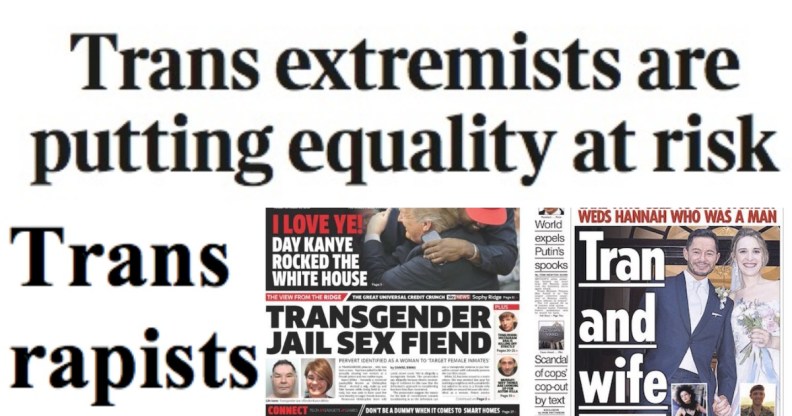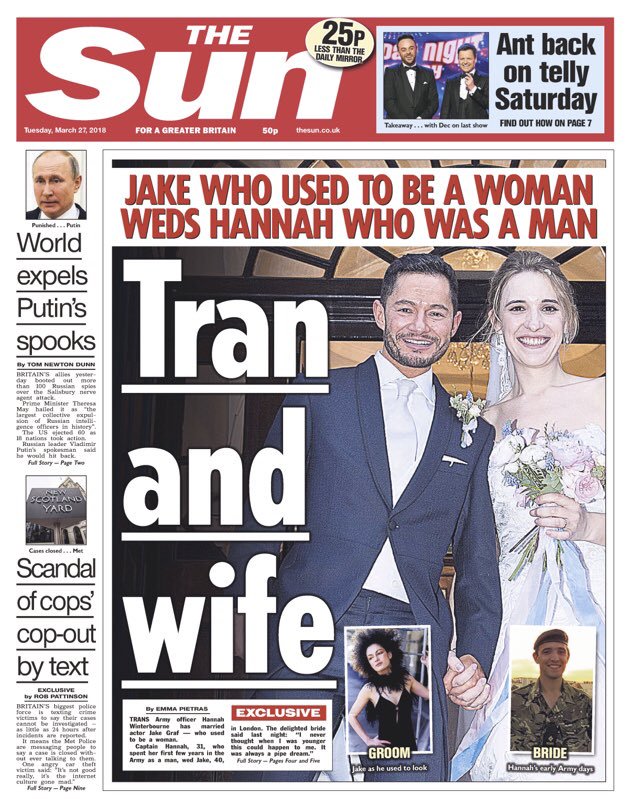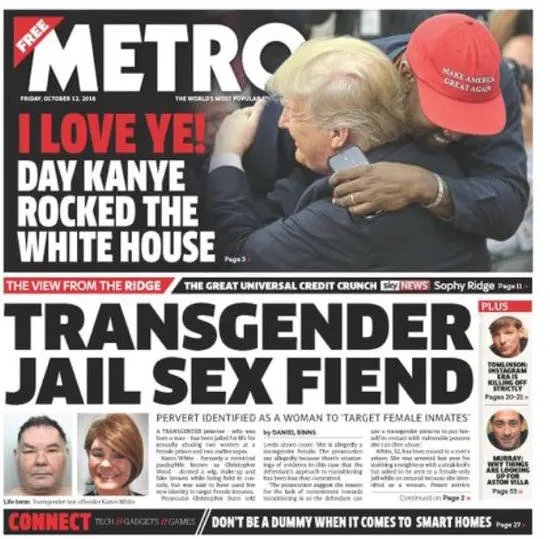Trans ‘extremists’ and ‘rapists’: How the media reported on trans people in 2018

Headlines about trans people, 2018.
It’s been a hard year for trans people living in the UK.
With the government announcing a long overdue reform of the Gender Recognition Act (GRA), trans people have been targeted by the national press at a heightened intensity.
The airing of dramas such as ITV’s Butterfly also sparked vitriolic press coverage about trans children and the work of charity Mermaids UK, which supports gender diverse kids.
The trans community have been hounded, dehumanised and demonised by the UK’s mainstream media on a regular basis.
Campaigners have compared the press’ treatment of trans people, which research has shown are disproportionately affected by mental health issues, to the media coverage of gay and bisexual men during the AIDS crisis in the 1980s.
All too often, trans people are treated like they are second-class citizens by the media.
To highlight this, PinkNews has compiled a list of anti-trans headlines throughout 2018, with the help of charity Trans Media Watch, which aims improve the media’s coverage of trans issues, and journalist Paris Lees.
“Tran and wife”—The Sun

A headline in The Sun on June 25 2018. (The Sun)
“Bullies and trolls”—The Times

An anti-trans headline in The Times on October 1 2018. (The Times)
“Trans lobby”—The Telegraph

A November 19 headline in The Telegraph. (The Telegraph)
“Women WILL be allowed to bar transgender people”—Daily Mail

A headline in the Daily Mail on June 24. (MailOnline)
“Trans stripper”—The Sunday Times

An anti-trans headline in The Sunday Times on December 23 2018. (The Sunday Times)
“Transgender drugs”—Daily Mail

A headline in the Daily Mail on November 30 2018. (Daily Mail)
“Cod science”—The Times

A headline about the trans community in The Times on December 22, 2018. (The Times)
“Trans extremists”—The Times

A headline in The Times on October 22 2018. (The Times)
“Trans twerps”—The Sunday Times

A headline in The Sunday Times on September 30 2018. (The Sunday Times)
“When a man explains to you what it means to be a woman?”—The Guardian

A March 31 2018 headline in the Guardian. (The Guardian)
“Slip on a frock, chaps”—The Times

A headline in The Times on September 27 2018. (The Times)
“Transgender jail sex fiend”—Metro

A headline in the Metro on October 12 2018. (Metro)
“Trans rapists”—The Times

A September 8 2018 headline in The Times. (The Times)
“Prison governors fear vulnerable inmates could be attacked”—The Mail on Sunday

A June 2 2018 headline in The Mail on Sunday. (Mail Online)
“An experiment”—The Times

A headline in The Times on August 18 2018. (The Times)
“The tyranny of the transgender minority”—The Telegraph

A headline in The Telegraph on October 17 2018. (The Telegraph)
“Where rights collide”—The Guardian

An editorial by the Guardian‘s UK team on October 17 2018, which was criticised by the paper’s US office. (Guardian)
Anti-trans coverage is contributing to mental health problems, say trans campaigners
In October, PinkNews published an open letter signed by lords, MPs, and leading LGBT+ campaigners, which condemned anti-trans media coverage in the UK, saying this hostility has led to a “significant decline in the mental health of many trans people.”
It also demanded that British media revise their coverage of trans issues.
“We strongly condemn the way the British media has given significant coverage to small groups who wish to push organisations to break existing law with regards to trans people,” the letter reads.
It adds: “This coverage has often conflated trans women and girls with sex offenders, implied that all trans women and girls are threats, and has usually been insufficiently challenged.
“The reality is that trans people are far more likely to be targets of violence than other women. Isolated extreme and abhorrent cases cannot be extrapolated to infer the behaviour of all trans people.”
The letter continues: “The relentlessness of the hostility across the media and the media’s inability to adequately challenge the false claims put forward have led to a significant decline in the mental health of many trans people.”
Among the 41 signatories on the letter are MPs including the Liberal Democrats’ deputy leader Jo Swinson and the ex-shadow secretary for women and equalities Sarah Champion.
It was also signed by Susie Green, CEO of Mermaids UK; Jay Stewart, founder of Gendered Intelligence; Christine Burns, author of Trans Britain: Our Journey from the Shadows; and trans campaigners and non-binary film makers Owl and Fox Fisher.
Studies have shown that trans people experience a higher rate of mental health populations than the rest of the population.
In September, research by the University of Arizona in the US found that more than half (51 percent) of trans male teenagers—and 30 percent of trans female teens—have attempted suicide in the past year.
And, in 2016, a study by the NationalCentre for Transgender Equality found that 40 percent of transgender people had tried to end their lives.

